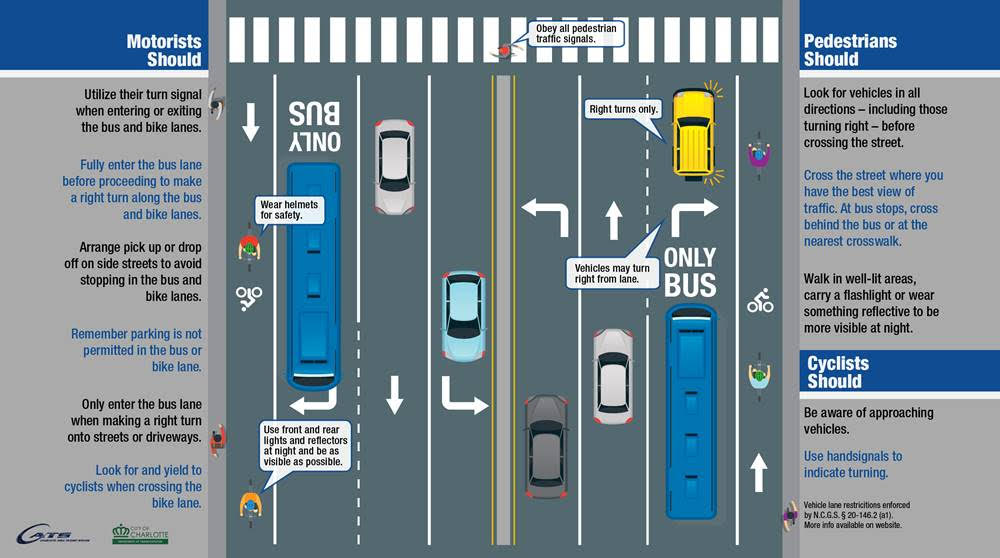Central Ave bus lane pilot: improving equitable transportation choices

Partner Post by the Charlotte Area Transit System (CATS)
Teamwork makes the dream work!
Charlotte Area Transit System (CATS) and the Charlotte Department of Transportation (CDOT) have partnered to introduce a new dedicated bus lane pilot along Central Avenue between Eastway Drive and the Eastland Transit Center. Bicycle traffic will maintain use of the existing bike lane along Central Avenue and motorists are only permitted to enter the lane when making a right-hand turn to access connecting streets, businesses and other destinations.
Dedicated transit lanes are a growing trend around the country as cities look for ways to provide more transportation options, improve safety and encourage residents to make sustainable transportation choices. Several cities, including D.C., Boston, Portland, Chicago and Indianapolis, are seeing success of bus only lanes.
On December 16, 2019, CATS and CDOT implemented Charlotte’s first dedicated bus/bike lane along 4th Street in Uptown. The dedicated bus lane transformed the rightmost travel lane of traffic into a lane restricted to CATS buses, school buses and emergency vehicle use only. In addition to the bus/bike lane, CATS and CDOT also installed a series of “floating bus stop” platforms, designed to allow buses to make in-lane stops without disrupting the flow of the bicycle lane.
With the success of the 4th Street Bus/Bike Lane pilot and the recent changes in traffic patterns as a result of the COVID-19 pandemic, the City saw an opportunity to test a second bus lane along Central Avenue. Central Avenue has always been a busy transit corridor. Central Avenue averaged over 4,800 weekday riders before the pandemic and is currently is the highest corridor in CATS’ network in terms of ridership and frequency. Central Avenue also serves as an important connection between two transportation hubs: the Eastland Community Transit Center and the Charlotte Transportation Center. During the pilot, CATS will extend the 10-minute frequency along that corridor from 6:30 a.m.- 7:00 p.m.
Dedicated bus lanes are just one part of Envision My Ride, CATS’ ongoing, three-part effort to redesign and improve the bus system. Phase 1 of Envision My Ride, which began in 2018, focused on restructuring the system and moved away from the outdated spoke-and-hub model by introducing more direct, cross-town and suburb-to-suburb bus service. Phase 2, implemented in early 2020, focused on frequency. CATS increased frequency on key routes to 15-minute intervals and implemented MetroRapid (BRT) on I-77 Express Lanes. Now, in Phase 3, CATS is committed to reliability. While it’s important to improve the structure and the frequency of a bus network, if buses are stuck in the same roadway traffic, your system’s reliability can suffer.
CATS hopes to accomplish Phase 3 goals through the Bus Priority Study starting this fall and identify additional opportunities to improve service along key corridors. CATS staff will evaluate ways to improve reliability through treatments such as dedicated bus lanes, transit signal prioritization, queue jumpers and other technologies. The study will also evaluate how to improve the overall transit experience for bus riders by developing a capital improvement program for amenities on CATS bus service and at bus stops.
Over the next six months, CATS will evaluate the Central Avenue Bus Lane pilot and CDOT will closely monitor traffic conditions. Traffic signal timings can be adjusted to mitigate any adverse traffic impacts.
With the success of Phase 1 bus/bike lane pilot and lessons learned from Phase 2 bus lane pilot, the Bus Priority Study will also evaluate a possible Phase 3 bus lane extension from Eastway to Uptown. Residents, local business members, bus riders, cyclists, motorists and pedestrians who regularly travel this route are encouraged to provide feedback on their experiences in a survey.
For more information on this pilot, visit the City of Charlotte website.
Thanks for reading!
As a nonprofit, community support is essential for us to keep doing what we do — including providing free articles like this. If you found this article helpful, please consider supporting Sustain Charlotte.
Want to stay in the loop? Subscribe to our weekly newsletter and follow us on Instagram, Facebook, and Twitter.
